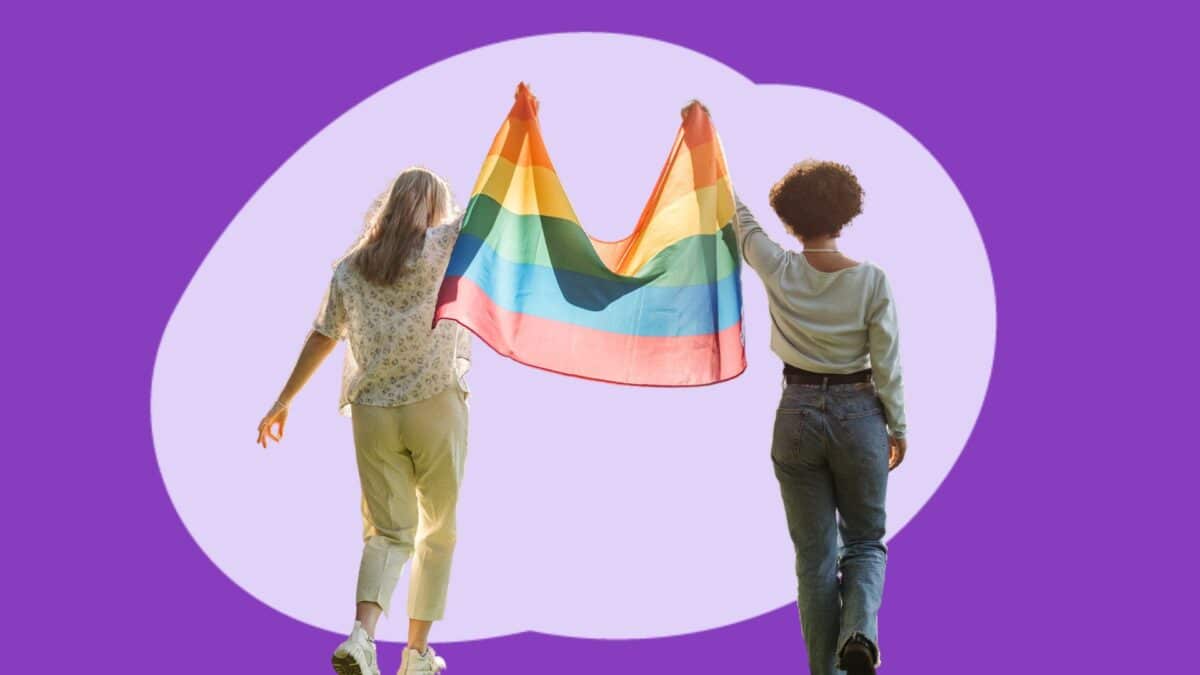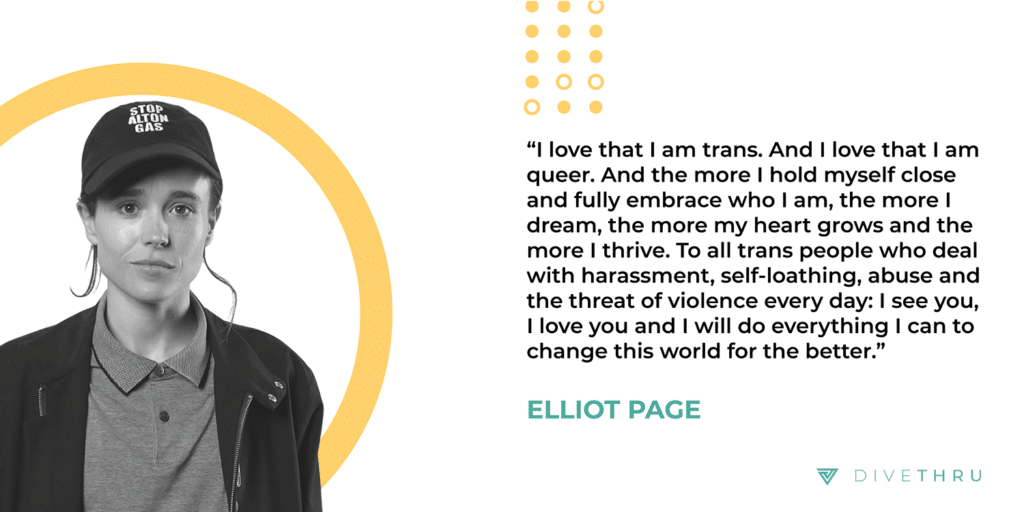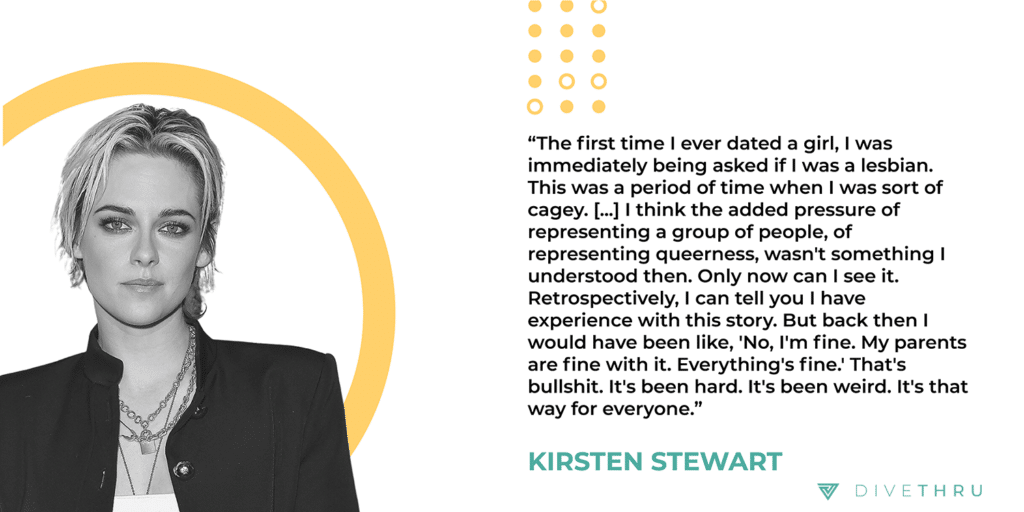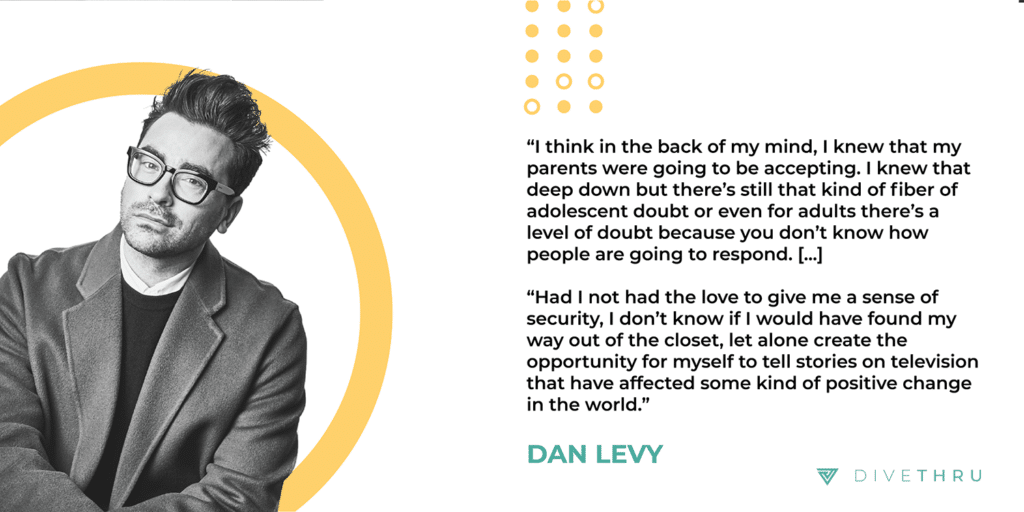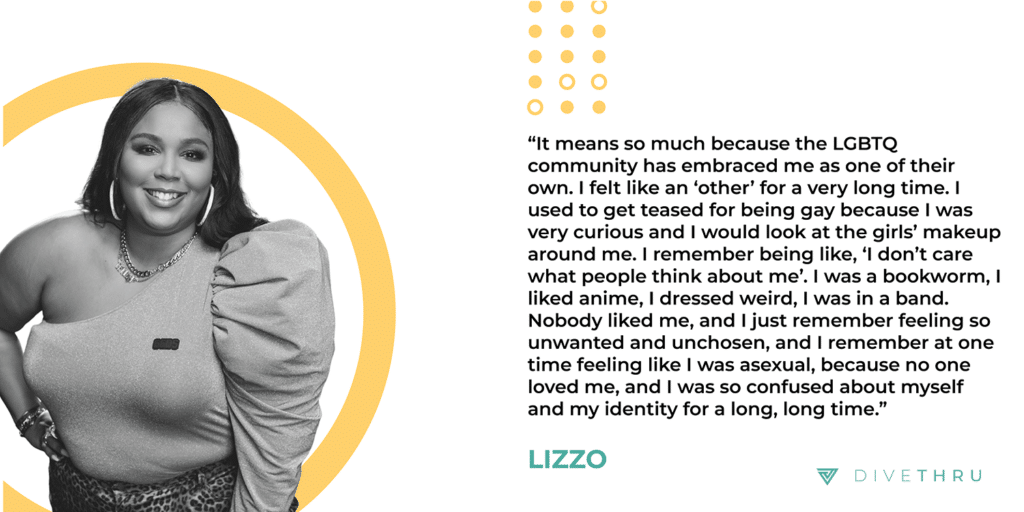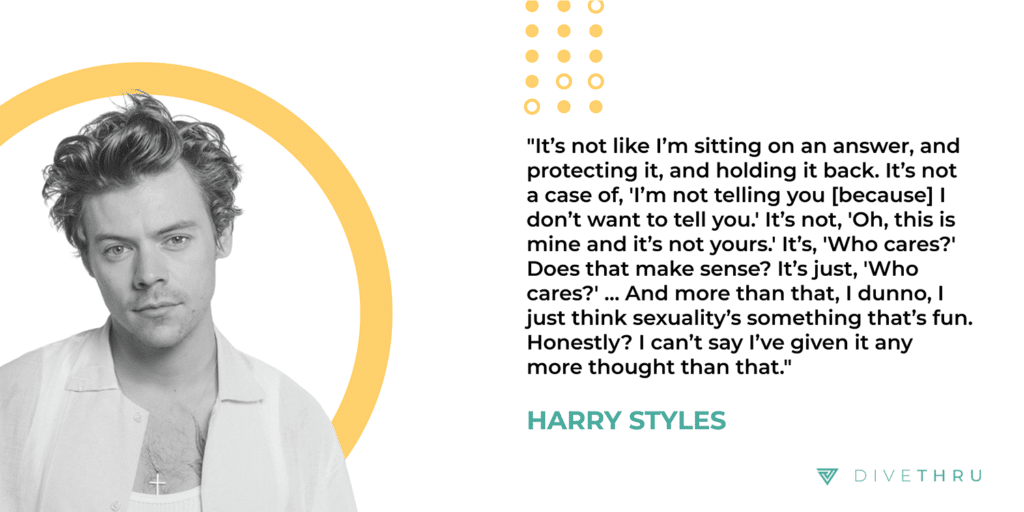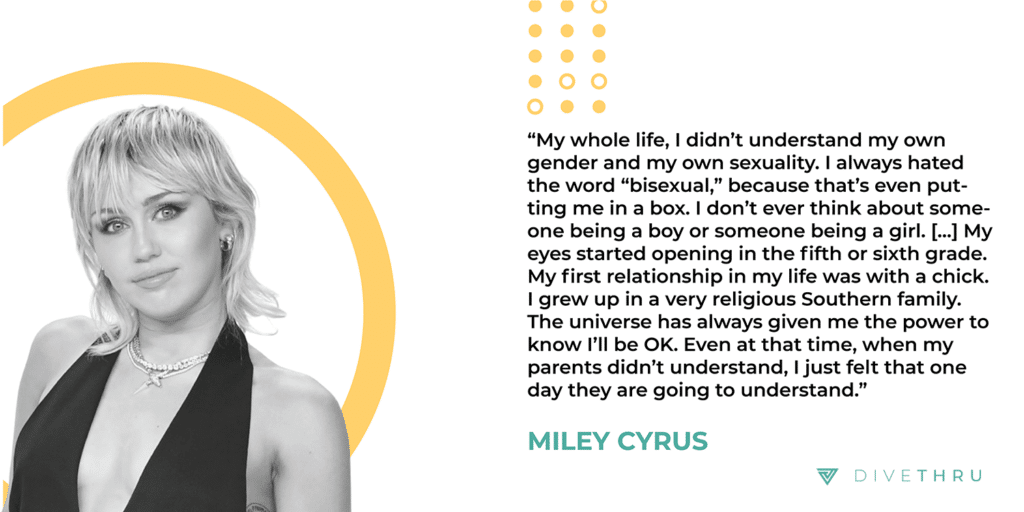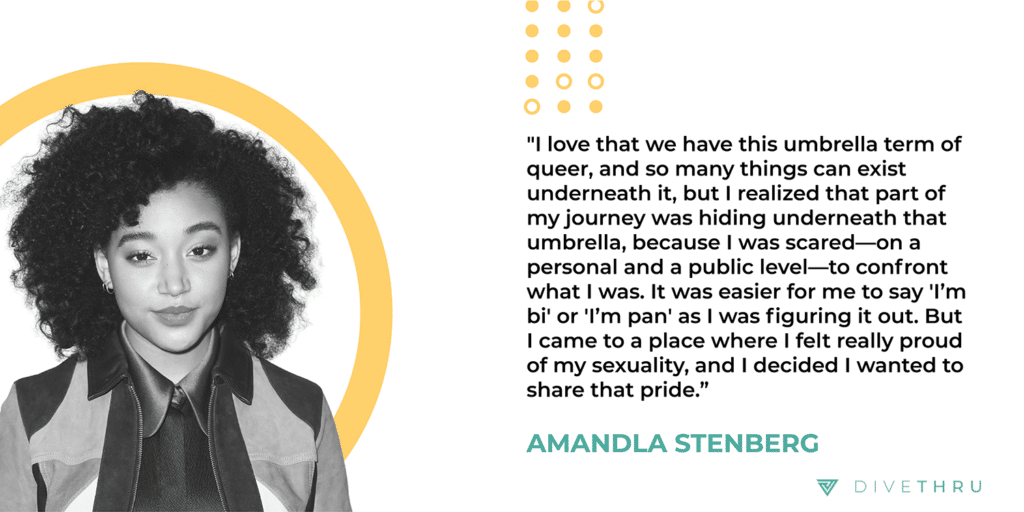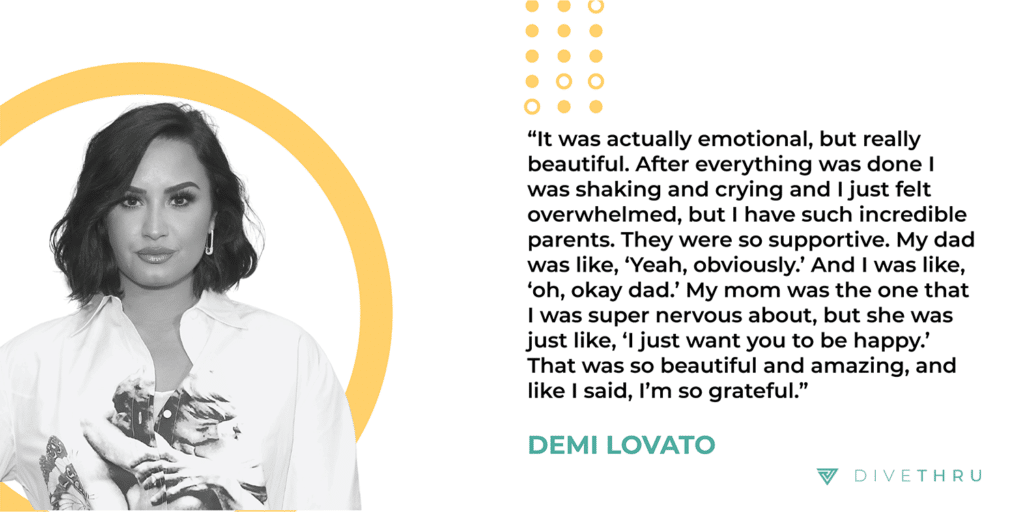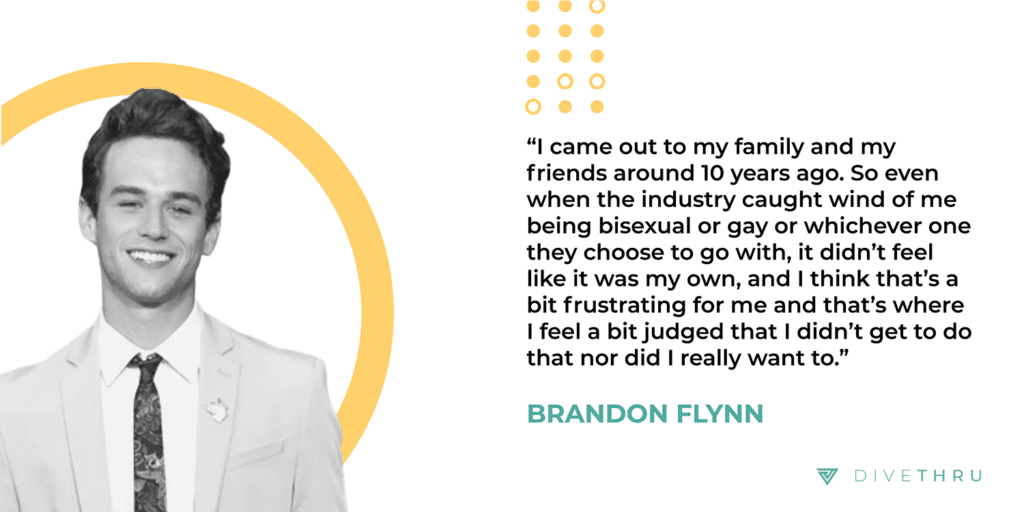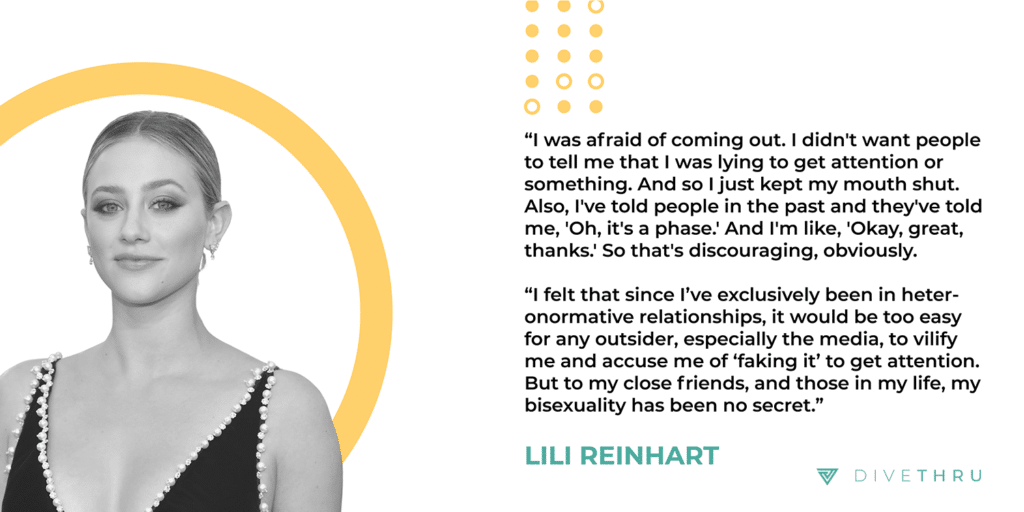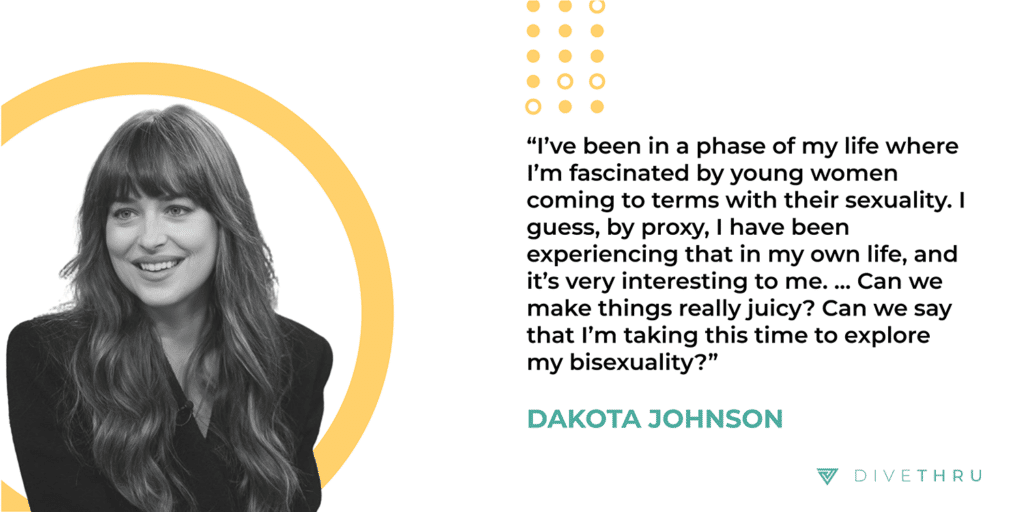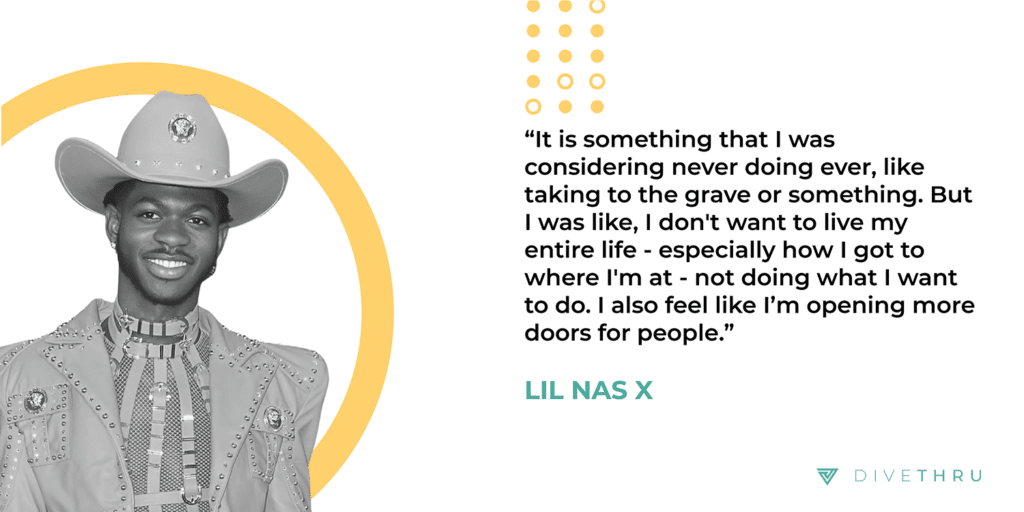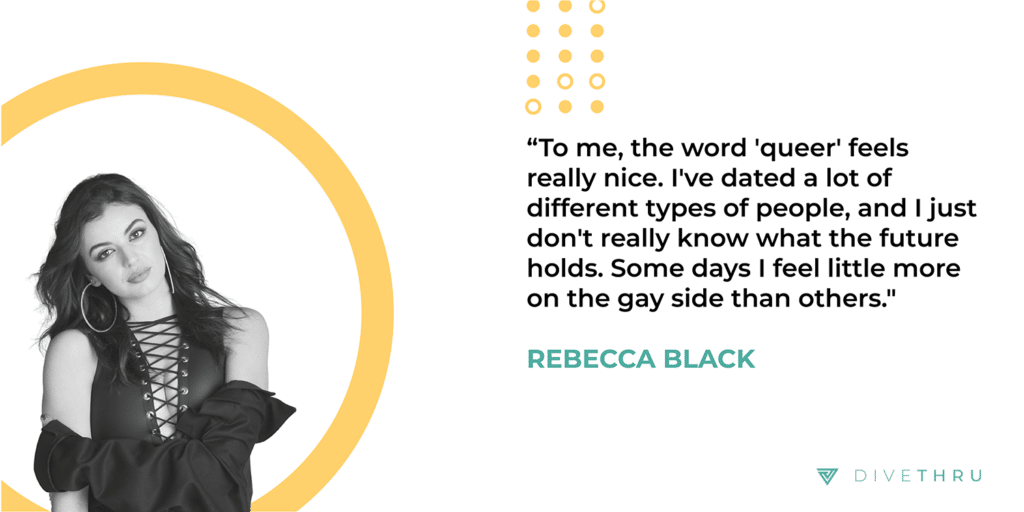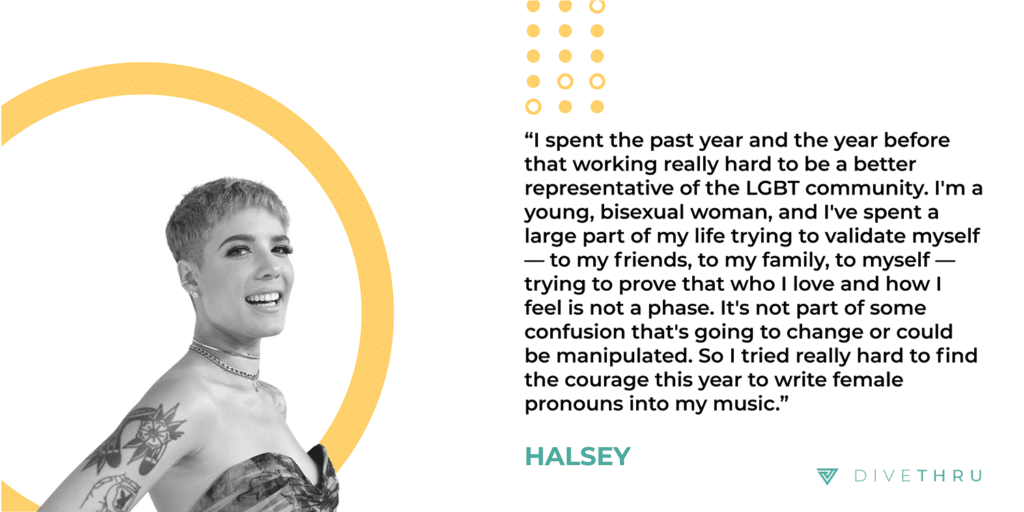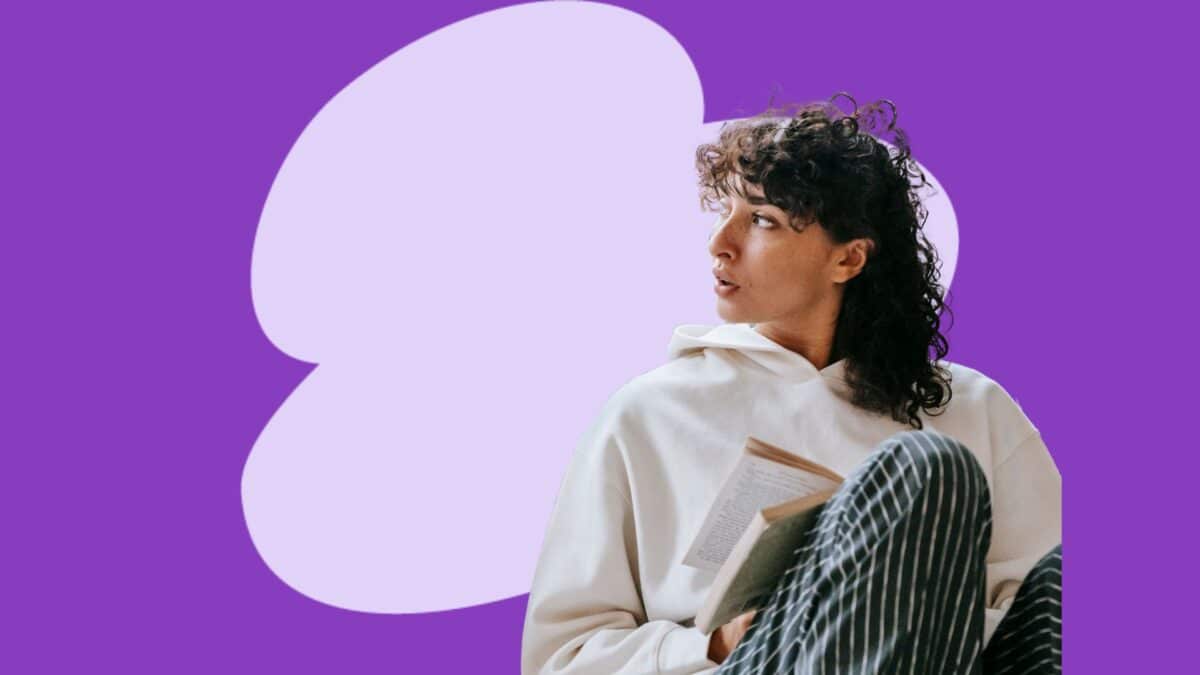For a lot of people, coming out is a really big deal. At DiveThru, we’re here to support you on this journey! If you’re ready to come out, or have thought a lot about how you would do it, there’s probably been sooo many things running through your head. How will my friends and family react? Will it change my relationships with them? Will I be accepted for who I really am? It can make you feel alone, like nobody understands what you’re going through. But we’re here to tell you that’s not the case! And since you’ll have a hard time believing us, we’re going to do that through these other incredible people and some of their coming out stories!
It can be really helpful and inspiring to hear from our role models and their experiences. Just because they’re out and proud now, doesn’t mean it was always easy for them to own their sexuality! They all had to have that conversation with the people in their lives, too. And just like they have the LGBTQ+ community supporting them, so will you! So many others have been in your shoes. So definitely lean on that support system, whenever and however you decide to come out.
To show you’re not alone, we’ve put together some coming out stories from some of your favourite celebrity role models who have also been there.
Elliot Page
“Hi friends, I want to share with you that I am trans, my pronouns are he/they and my name is Elliot. I feel lucky to be writing this. To be here. To have arrived at this place in my life… I can’t begin to express how remarkable it feels to finally love who I am enough to pursue my authentic self. I’ve been endlessly inspired by so many in the trans community. Thank you for your courage, your generosity and ceaselessly working to make this world a more inclusive and compassionate place. I will offer whatever support I can and continue to strive for a more loving and equal society…
To be clear, I am not trying to dampen a moment that is joyous and one that I celebrate, but I want to address the full picture. The statistics are staggering. The discrimination towards trans people is rife, insidious and cruel, resulting in horrific consequences…I love that I am trans. And I love that I am queer. And the more I hold myself close and fully embrace who I am, the more I dream, the more my heart grows and the more I thrive. To all trans people who deal with harassment, self-loathing, abuse and the threat of violence every day: I see you, I love you and I will do everything I can to change this world for the better.
Thank you for reading this. All my love, Elliot.”
Kristen Stewart
“The first time I ever dated a girl, I was immediately being asked if I was a lesbian. And it’s like, ‘God, I’m 21 years old.’ I felt like maybe there were things that have hurt people I’ve been with. Not because I felt ashamed of being openly gay but because I didn’t like giving myself to the public, in a way. It felt like such thievery. This was a period of time when I was sort of cagey. Even in my previous relationships, which were straight, we did everything we could to not be photographed doing things—things that would become not ours.
So I think the added pressure of representing a group of people, of representing queerness, wasn’t something I understood then. Only now can I see it. Retrospectively, I can tell you I have experience with this story. But back then I would have been like, ‘No, I’m fine. My parents are fine with it. Everything’s fine.’ That’s bullshit. It’s been hard. It’s been weird. And it’s that way for everyone.”
Dan Levy
“I think in the back of my mind, I knew that my parents were going to be accepting. I knew that deep down but there’s still that kind of fibre of adolescent doubt or even for adults there’s a level of doubt because you don’t know how people are going to respond. You’ve been almost conditioned through what you see in the media to be met with persecution of some kind. … You’re just trying to grapple with the reality that is slowly coming to you in little spurts.”
“Had I not had the love to give me a sense of security, I don’t know if I would have found my way out of the closet, let alone create the opportunity for myself to tell stories on television that have affected some kind of positive change in the world.”
Lizzo
“It means so much because the LGBTQ community has embraced me as one of their own. I felt like an ‘other’ for a very long time. I used to get teased for being gay because I was very curious and I would look at the girls’ makeup around me. And I remember being like, ‘I don’t care what people think about me.’ I was a bookworm, I liked anime, I dressed weird, I was in a band. Nobody liked me, and I just remember feeling so unwanted and unchosen, and I remember at one time feeling like I was asexual, because no one loved me, and I was so confused about myself and my identity for a long, long time.”
Harry Styles
“It’s not like I’m sitting on an answer, and protecting it, and holding it back. It’s not a case of, ‘I’m not telling you [because] I don’t want to tell you.’ It’s not, ‘Oh, this is mine and it’s not yours.’ It’s, ‘Who cares?’ Does that make sense? It’s just, ‘Who cares?’ … And more than that, I dunno, I just think sexuality’s something that’s fun. Honestly? I can’t say I’ve given it any more thought than that.”
Miley Cyrus
“My whole life, I didn’t understand my own gender and my own sexuality. I always hated the word “bisexual,” because that’s even putting me in a box. I don’t ever think about someone being a boy or someone being a girl. … My eyes started opening in the fifth or sixth grade. My first relationship in my life was with a chick. I grew up in a very religious Southern family. The universe has always given me the power to know I’ll be OK. Even at that time, when my parents didn’t understand, I just felt that one day they are going to understand.”
Amandla Stenberg
“I love that we have this umbrella term of queer, and so many things can exist underneath it, but I realized that part of my journey was hiding underneath that umbrella, because I was scared—on a personal and a public level—to confront what I was. It was easier for me to say ‘I’m bi’ or ‘I’m pan’ as I was figuring it out. But I came to a place where I felt really proud of my sexuality, and I decided I wanted to share that pride.”
Demi Lovato
“It was actually emotional, but really beautiful. After everything was done I was shaking and crying and I just felt overwhelmed, but I have such incredible parents. They were so supportive. My dad was like, ‘Yeah, obviously.’ And I was like, ‘oh, okay dad. My mom was the one that I was super nervous about, but she was just like, ‘I just want you to be happy.’ That was so beautiful and amazing, and like I said, I’m so grateful.”
Brandon Flynn
“I came out to my family and my friends around 10 years ago. So even when the industry caught wind of me being bisexual or gay or whichever one they choose to go with, it didn’t feel like it was my own, and I think that’s a bit frustrating for me and that’s where I feel a bit judged that I didn’t get to do that nor did I really want to.
It didn’t seem that it would make a difference whether I came out or not because it’s just my life, and if people were watching my life, they would just know that. But it did feel like I had to come out — even though I didn’t ever come out to the public, in a weird way, I just one day read an article where I came out in the terms that they wanted me to come out.”
Lili Reinhart
“I was afraid of coming out. I didn’t want people to tell me that I was lying to get attention or something. And so I just kept my mouth shut. Also, I’ve told people in the past and they’ve told me, ‘Oh, it’s a phase.’ And I’m like, ‘Okay, great, thanks.’ So that’s discouraging, obviously.
“I felt that since I’ve exclusively been in heteronormative relationships, it would be too easy for any outsider, especially the media, to vilify me and accuse me of ‘faking it’ to get attention. But to my close friends, and those in my life, my bisexuality has been no secret.”
Dakota Johnson
“I’ve been in a phase of my life where I’m fascinated by young women coming to terms with their sexuality. I guess, by proxy, I have been experiencing that in my own life, and it’s very interesting to me. … Can we make things really juicy? Can we say that I’m taking this time to explore my bisexuality?”
Lil Nas X
“It is something that I was considering never doing ever, like taking to the grave or something. But I was like, I don’t want to live my entire life – especially how I got to where I’m at – not doing what I want to do. I also feel like I’m opening more doors for people.”
Rebecca Black
“To me, the word ‘queer’ feels really nice. I’ve dated a lot of different types of people, and I just don’t really know what the future holds. Some days I feel little more on the gay side than others.”
Halsey
“I spent the past year and the year before that working really hard to be a better representative of the LGBT community. I’m a young, bisexual woman, and I’ve spent a large part of my life trying to validate myself — to my friends, to my family, to myself — trying to prove that who I love and how I feel is not a phase. It’s not part of some confusion that’s going to change or could be manipulated. So I tried really hard to find the courage this year to write female pronouns into my music.”
We hope these coming out stories from some of the biggest stars will inspire you and make you feel less alone. How and when you decide to come out is totally up to you. And when you’re ready, just remember: we are rooting for you!


